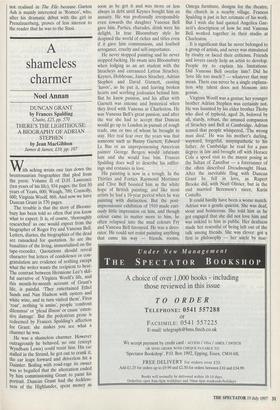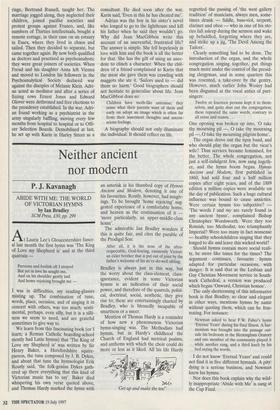A shameless charmer
Noel Annan
DUNCAN GRANT by Frances Spalding Chatto, £25, pp. 570 THERE'S THE LIGHTHOUSE: A BIOGRAPHY OF ADRIAN STEPHEN by Jean MacGibbon James & James, £10, pp. 187 With aching wrists one lays down the brontosaurian biographies that plod from the press: Volume II of D.H. Lawrence (ten years of his life), 934 pages; the first 50 years of Yeats, 600; Waugh, 700; Connolly, 600; Virginia Woolf, 860. And now we have Duncan Grant in 570 pages. The trouble is that the story of Blooms- bury has been told so often that you know what to expect. It is, of course, 'thoroughly researched' as one would expect from the biographer of Roger Fry and Vanessa Bell. Letters, diaries, the biographies of the dead are ransacked for quotation. So are the banalities of the living, immortalised on the tape-recorder. Quotations should reveal character but letters of condolence or con- gratulation are evidence of nothing except what the writer wants the recipient to hear. The contrast between Hermione Lee's skil- ful narrative of Virginia Woolf s life, and this month-by-month account of Grant's life, is painful. 'They entertained Ethel Sands and Nan Hudson with oysters and white wine, and in turn visited them'. Fires `roar', nothing 'is amiss', people 'confront dilemmas' or 'plead illness' or cause 'exten- sive damage'. But the pedestrian prose is redeemed by Frances Spalding's affection for Grant: she makes you see what a charmer he was.
He was a shameless charmer. However outrageously he behaved, no one (except Wyndham Lewis) could resist him. His car stalled in the Strand, he got out to crank it, the car leapt forward and driverless hit a Daimler. Boiling with road-rage its owner was so beguiled that the altercation ended by him commissioning Grant to paint his portrait. Duncan Grant had the feckless- ness of the Highlander, spent money as soon as he got it and was more or less always in debt until Keynes bought him an annuity. He was profoundly irresponsible even towards the daughter Vanessa Bell gave him. Parties, charades, drink were his delight. In true Bloomsbury style he despised the world of riches and titles even if it gave him commissions, and loathed arrogance, cruelty and self-importance.
He never stopped painting and he never stopped fucking. He swam into Bloomsbury when lodging as an art student with the Stracheys and entranced Lytton Strachey, Keynes, Hobhouse, James Strachey, Adrian Stephen and David Garnett, causing `havoc', as he put it, and leaving broken hearts and seething jealousies behind him. But he knew passion, and his affair with Garnett was intense and hysterical when they lived with Vanessa at Charleston. He was Vanessa Bell's great passion, and after the war she had to accept that Duncan would go up to London in pursuit of rough trade, one or two of whom he brought to stay. Her real fear over the years was that someone such as Bunny Garnett, Edward Le Bas or an unprepossessing American painter George Bergen would infatuate him and she would lose him. Frances Spalding does well to describe his suffer- ings and ecstasies in love.
His painting is now in a trough. In the Thirties and Forties Raymond Mortimer and Clive Bell boosted him as the white hope of British painting; and like most artists he had a 10-year period when he was painting with distinction. But the post- impressionist exhibition of 1910 made curi- ously little impression on him, and though colour came to matter more to him, he often relapsed into the mud colours Fry and Vanessa Bell favoured. He was a deco- rator. He could not resist painting anything that came his way — friends, rooms, Omega furniture, designs for the theatre, the church in a nearby village. Frances Spalding is just in her estimate of his work. But I wish she had quoted Angelica Gar- nett's description of how he and Vanessa Bell worked together in their studio at Charleston.
It is significant that he never belonged to a group of artists, and never was stimulated by rivalry or faced their criticism. Friends and lovers rarely help an artist to develop. People try to explain his limitations. Did Vanessa Bell overlay him? Did he `love life too much'? — whatever that may mean. There can never be a single explana- tion why talent does not blossom into genius.
Virginia Woolf was a genius; her younger brother Adrian Stephen was certainly not. He was haunted by his elder brother Thoby who died of typhoid, aged 26, beloved by all, sturdy, robust, the amused companion of Strachey and Bell at Cambridge. Adrian sensed that people whispered, 'The wrong man died.' He was his mother's darling, wayward, forgetful, unsympathetic to his father. At Cambridge he read for a pass degree in law and brought off with Horace Cole a spoof visit to the mayor posing as the Sultan of Zanzibar — a forerunner of the often described Dreadnought Hoax. After the inevitable fling with Duncan Grant he fell in love, as Rupert Brooke did, with Noel Olivier, but in the end married Berenson's niece, Karin Costello.
It could hardly have been a worse match. Adrian was a gentle quietist. She was deaf, stout and boisterous. She told him as he got engaged that she did not love him and was unkind to him in public. Her deafness made her resentful of being left out of the talk among friends. She was clever: got a first in philosophy — her uncle by mar- riage, Bertrand Russell, taught her. The marriage jogged along, they neglected their children, joined pacifist societies and protest groups against Franco, and, like numbers of Thirties intellectuals, bought a remote cottage, in their case on an estuary in Essex, where they lived in chaos and sailed. Then they decided to separate, but came together again. By now both qualified as doctors and practised as psychoanalysts; they were great joiners of societies. When Freud and his daughter Anna left Vienna and moved to London his followers in the Psychoanalytical Society declared war against the disciples of Melanie Klein. Adri- an acted as mediator and after a series of fizzing rows Ernest Jones and Edward Glover were dethroned and free elections to the presidency established. In the war, Adri- an found working as a psychiatrist in the army singularly baffling, moving every few months from hospital to hospital or to Offi- cer Selection Boards. Demobilised at last, he set up with Karin in Harley Street as a consultant. He died soon after the war. Karin said, 'Even in this he has cheated me'.
Adrian was the boy in his sister's novel who longed to go to the lighthouse and kill his father when he said they wouldn't go. Why did Jean MacGibbon write this account of an uneventful, frustrated life? The answer is simple. She fell hopelessly in love with him and the book is all the better for that. She has the gift of using an anec- dote to clinch a character. When the chil- dren of a friend complained to Karin that the meat she gave them was crawling with maggots she ate it. 'Sailors used to — did them no harm.' Good biographers should not hesitate to generalise about life. Jean MacGibbon does so:
Children have moth-like antennae; they sense what their parents want of them and early on adopt an image which is often far from their innermost thoughts and uncon- scious feelings.
A biography should not only illuminate the individual. It should reflect on life.



























































 Previous page
Previous page